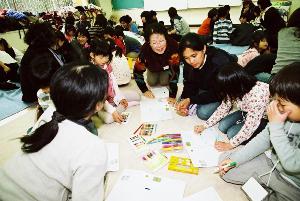|
|
Asian Educators Symposium and Exchange Program: Creating a Culture of Peace through Education
an article by Masami Miyazaki
The Goi Peace Foundation and the Asia/Pacific Cultural Centre
for UNESCO (ACCU) co-organized the Asian Educators Symposium and
Exchange Program “Creating a Culture of Peace through Education” in
Japan from 18 to 25 February 2008, bringing together teachers from
Asian countries who are actively engaged in peace education.
One of the key action areas of UNESCO is fostering a culture of peace
through education by revising the educational curricula to promote
qualitative values, attitudes and behaviors of a culture of peace,
including peaceful conflict prevention and resolution, dialogue,
consensus-building and active non-violence.
The Asian Educators Symposium provided opportunity for the participants
to exchange their innovative and effective teaching programs,
activities and methodologies, so that they may advance their efforts
for peace education in their home countries, and thereby contribute to
the creation of a culture of peace in the region and beyond.

click on image to enlarge
Ten educators were invited from Israel, India, Australia, Nepal,
Pakistan, the Philippines, and USA. During the 2-day symposium held at
the National Olympics Memorial Youth Center in Tokyo, they were joined
by 23 Japanese educators involved in either formal or non-formal
education. The program consisted of an introduction as well as three
workshop sessions with the following objectives:
1) To identify the “Universal Values of a Culture of Peace” and discuss how they can be effectively taught in classrooms.
2) To identify the various forms of violence which exist in schools and discuss how they can be overcome.
3) To discuss what kinds of education are needed in order to nurture a responsible global citizen.
An Open Forum was organized to share some of the highlights from the
symposium with the public. About 100 participants, many of them
educators themselves, enjoyed exchanging opinions with the teachers
from abroad.
The international participants also visited local schools and
community classrooms to observe the various educational efforts being
made in Japan. Additionally, they made a trip to Kyoto and Hyogo to
deepen their understanding of Japanese culture and traditions. The
extensive 7-day program offered a great learning and networking
opportunity for all the participants, who had become like one family
ready to support one another in their shared mission as educators and
peace-builders.
|
|







 |
DISCUSSION
Question(s) related to this article:
Peace Studies in School Curricula
What would it take to make it happen around the world?
As a reader, you are invited to join in the discussion of this
article based on any of the above question(s): just click on the
question, read the previous comments and add a new reply. You may also
enter a new discussion topic on this article - see bottom of this page.
Thematic forum(s) in which this article is being discussed:
SCHOOLS AND PEACE EDUCATION
Latest reader comment:
During
the Asian Educators Symposium, we found out that Peace Education is
still not part of the school curriculum in most countries. However, the
participating teachers have been incorporating peace education in their
teaching subjects, such as English, social studies, and character
education. We all agreed that love and the will to nurture peace in
children are the most important basis for peace education. Even if
peace education is not a part of the curriculum, peace can be taught
through any subject. Whatever you are teaching, if it comes from the
heart, then it will touch the minds of children.

|
|
|
This report was posted on July 31, 2008. The moderator is CPNN Administrator.
If you wish to start a new discussion topic on this article, please copy the title of this article which is Asian Educators Symposium and Exchange Program: Creating a Culture of Peace through Education and its number which is 410 and enter this information along with your discussion question and a brief text on the new topic form.

A few stories are retained on the main listings if they are considered
by readers to be a priority. If you have not already done so, please
take the time to check a box below: should this article be considered
as a priority?

|





